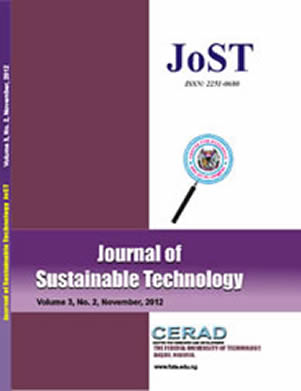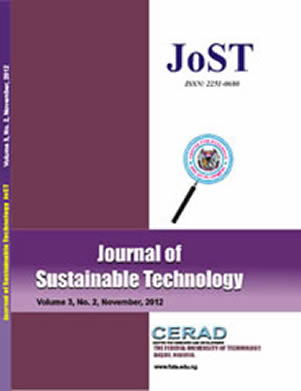The effect of blanching conditions on the microbiological quality of flour produced from plantain (Musa AAB) and sensory qualities of reconstituted plantain flour (dumpling or amala) were investigated. Results showed that varying the blanching temperature and time had considerable effects on the microbial quality of the plantain flour. The total viable counts of samples of unripe plantain pulp blanched at 60 oC for 5 minutes (UPB60 – 5 ), unripe plantain pulp blanched at 60 oC for 10 minutes (UPB60 – 10 ) and unripe plantain pulp blanched at 80 oC for 5 minutes (UPB80 – 5) were the same (2.0 cfu/gx103). Whereas, extending the duration of blanching at 60 oC to 15 minutes (UPB60 – 15) and dipping the samples in hot water at 80 and 100 oC for 10 and 15minutes (UPB80 – 10, UPB80 – 15, UPB100 – 10 and UPB100 – 15) reduced the total viable count significantly. The control unblanched sample (UPUBCO) had the highest total viable count of 3.0 cfu/g x103. Coliform was not found in any of the blanched samples. Mould and yeast growth were also higher in the control and samples blanched at a lower temperature of 60 oC for 5 and 10 minutes compared to the other samples treated at higher temperatures and longer duration. For the sensory quality evaluation, the samples blanched at 60 oC for 10 and 15 minutes were rated best for taste, colour and texture. Amala produced with plantain slices blanched at 60OC for 5 min had a similarly preferred texture but was less acceptable in terms of colour and taste. The Panelists downgraded products from plantain slices dipped in hot water at temperatures above 80OC for more than 10 minutes particularly in terms of colour, taste and texture.
PAPER TITLE :MICROBIAL AND SENSORY QUALITIES OF PLANTAIN FLOUR AND ITS RECONSTITUTED DUMPLING (AMALA) AS INFLUENC
JOURNAL Of SUSTAINABLE TECHNOLOGY | VOLUME 2 NUMBER 11 2011
Paper Details
- Author(s) : OLUWALANA, I. B. OLUWAMUKOMI, M. O., FAGBEMI, T. N. and OLUWAFEMI, G.
- Abstract:



